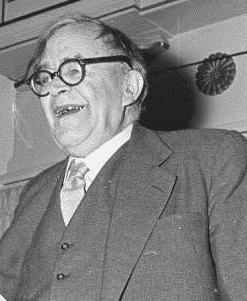Do the moral failings of a theologian–or a pastor, a scholar, an artist, or a statesman–invalidate what he or she says? Today authors of all sorts, especially those of the past, face cancellation for their retrograde beliefs and bad behavior.
Thomas Jefferson, for example, wrote eloquently about how “all men are created equal and are endowed by their creator with certain inalienable rights.” And yet, he owned and exploited slaves. He didn’t seem to practice his own stated beliefs. Shall we dismiss the words of the Declaration of Independence because they were written by a hypocrite?
Lutheran ethicist Gilbert Meilaender doesn’t address that issue, but he suggests how we might approach it in his First Things article The Continuing Relevance of the Donatist Controversy.
He begins by relating the saga of 20th century theologian Karl Barth. It turns out, despite being married, he fell in love with his assistant and collaborator Charlotte von Kirschbaum, to the point of having her move into his household with his wife and children. Should this adulterous relationship invalidate his theology? How about his writings on marriage, which in general uphold the Biblical standards but include what looks like a self-justifying loophole?
Meilaender quotes scholar Sarah Shin who discusses “the challenge posed by problematic biographies in theological inheritance.” Discussing Barth’s adultery and other transgressions by theologians, she worried that in teaching them, in Meilaender’s words, “we may transmit something rather like ‘problematic DNA.’”
He then brings to bear the 4th century heresy of Donatism. During the intense persecution of Christians under Diocletian, some Christians–including some priests–apostasized when threatened with torture or execution, denying their faith by handing over their Scriptures to the persecutors. After the persecutions subsided, churches went back to normal, including those led by priests who had given in to the persecutors. The Donatists taught that Holy Communion and Baptisms conducted by those priests who failed to stand strong during persecution were invalid. But the church came to reject Donatism as a heresy. The sacraments are a gift of God and their efficacy is not dependent on the holiness or moral worthiness of the priest.
Says Meilaender, citing 2 Corinthians 4:4-7:
We might by extension suggest that the efficacy of the words of a preacher—or, even, of the author of the Church Dogmatics—does not depend on his personal character. Disillusioning at it may be to learn that one from whom we learned of the grace and will of God has failed to live in accord with what he himself taught, that does not mean it could not in fact have been his words through which that grace became effective in our lives. It is “the knowledge of the glory of God in the face of Christ” that is, St. Paul says, the “treasure.” The fact that those who convey this treasure to us are mere “earthen vessels” simply shows “that the transcendent power belongs to God and not to us.”
This does not justify the misdeeds. It simply judges the words according to whether or not they are true, rather than according to the character of the person who spoke them. Meilaender concludes:
We live in a world that regularly seeks to eliminate public recognition of those who, though perhaps great in some ways, also had faults that may lead some to believe we can (or should) no longer learn from them (or honor them). And, as Barth’s marital failures have gained attention, it becomes increasingly easy to write off what he has to say about sexuality and marriage—to write it off as inevitably marred by troubling biographical facts. To be sure, “the web of our life is of a mingled yarn, good and ill together.” But if we take this fact as a reason not to read, discuss, or teach an author, we may soon have little to read. And, of course, the mingled yarn of our own lives may mean that we are far from being trustworthy readers.
Our task then—as it was the Church’s task during the Donatist controversy—is to distinguish clearly between the “life” and the “works” of those we read. That the “life” falls short, perhaps very short, in important ways, does not mean that the “works” cannot communicate God’s truth to us. We look through the eyes of the author; we do not look at the author. And what we want when we look through his eyes is a truth that is not, finally, his. The truth we seek comes from the One whom the Letter of James calls “the Father of Lights,” from whom comes every good and perfect gift. And at the heart of the Church’s rejection of Donatism was its conviction that these gifts of God can come to us even through the mediation of those whose moral failings are evident.
This does not mean that pastors who are abusive or corrupt or faithless should not be removed from office. It means that people whom they have baptized do not need to be re-baptized, and that their sermons–if in accord with Scripture–might still convey the Gospel.
And that we can condemn Jefferson’s hypocrisy and malfeasance while still affirming his preamble to the Declaration of Independence.
Photo: Karl Barth (1956) by Bundesarchiv, Bild 194-1283-23A / Lachmann, Hans / CC-BY-SA 3.0, CC BY-SA 3.0 de, https://commons.wikimedia.org/w/index.php?curid=51061479














